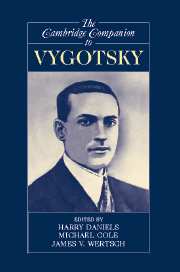Book contents
- Frontmatter
- Editors’ Introduction
- Part I: Vygotsky in Context
- 1 Vygotsky in Context: 1900-1935
- 2 Vygotsky’s Demons
- 3 An Interesting Resemblance: Vygotsky, Mead, and American Pragmatism
- 4 Vygotsky, Mead, and the New Sociocultural Studies of Identity
- 5 Vygotsky on Thinking and Speaking
- Part II: Readings of Vygotsky
- Part III: Applications of Vygotsky’s Work
- References
- Index
2 - Vygotsky’s Demons
from Part I: - Vygotsky in Context
Published online by Cambridge University Press: 28 November 2007
- Frontmatter
- Editors’ Introduction
- Part I: Vygotsky in Context
- 1 Vygotsky in Context: 1900-1935
- 2 Vygotsky’s Demons
- 3 An Interesting Resemblance: Vygotsky, Mead, and American Pragmatism
- 4 Vygotsky, Mead, and the New Sociocultural Studies of Identity
- 5 Vygotsky on Thinking and Speaking
- Part II: Readings of Vygotsky
- Part III: Applications of Vygotsky’s Work
- References
- Index
Summary
This chapter examines the philosophical dimensions of Vygotsky's legacy. Vygotsky was a profoundly original thinker, but he was not one whose independence of thought caused him to neglect the ideas of others. On the contrary, Vygotsky was exceptionally well-read. He had an impressive command of the European psychological literature and considerable knowledge of adjacent fields, such as anthropology and educational theory. His appreciation of literature and literary theory is well-known and justly celebrated. Less often remarked upon, however, is his debt to philosophy. In this field, too, he was well-versed, having majored in philosophy and history at the Shanyavsky People's University. Vygotsky was much influenced by the philosophical vision of Marx and Engels: Almost all of the many references to their writings in Vygotsky's Collected Works are to philosophical themes. He was also inspired by a number of philosophers who had influenced Marx and Engels, notably Hegel (whom Vygotsky had read in high school), Spinoza, and Feuerbach. Marxism and its antecedents, however, by no means exhaust Vygotsky's philosophical interests. He cites numerous other philosophers, including Aristotle, Bergson, Brentano, Descartes, Dewey, Dilthey, Fichte, Hobbes, Husserl, James, Kant, Lichtenberg, Malebranche, Nietzsche, Neurath, Plato, and Scheler.
- Type
- Chapter
- Information
- The Cambridge Companion to Vygotsky , pp. 50 - 76Publisher: Cambridge University PressPrint publication year: 2007
- 40
- Cited by

